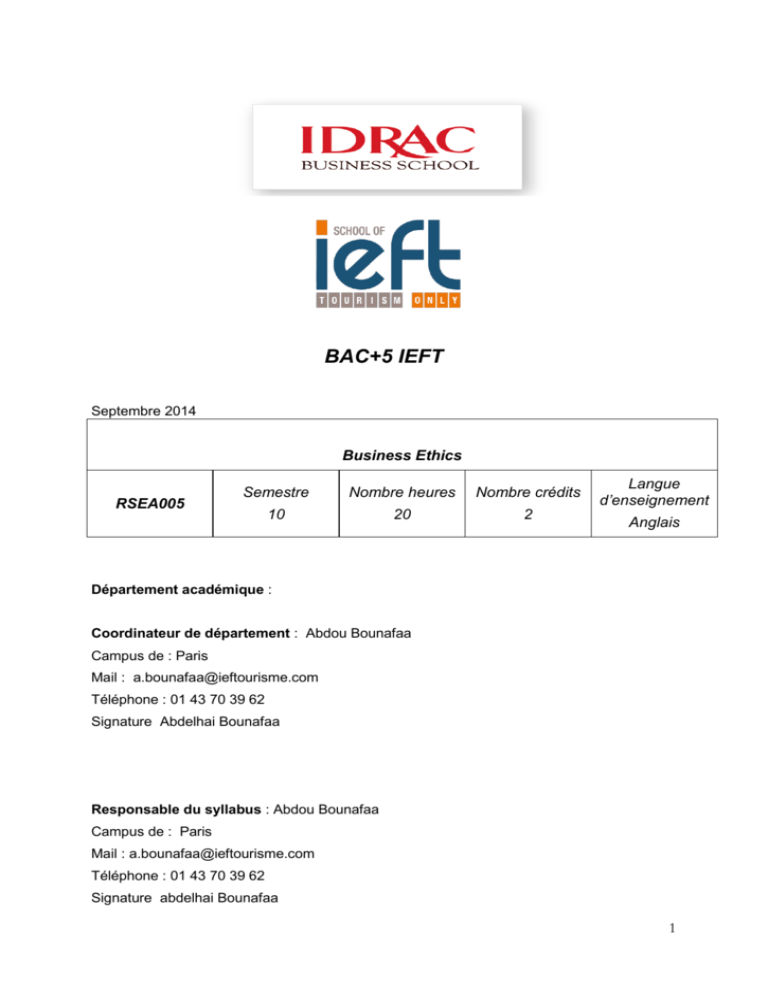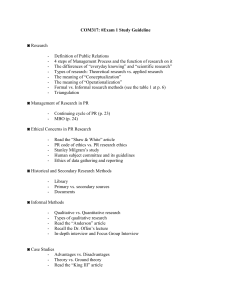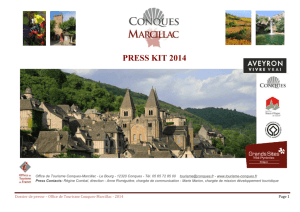BAC+5 IEFT
advertisement

BAC+5 IEFT Septembre 2014 Business Ethics RSEA005 Semestre Nombre heures Nombre crédits 10 20 2 Langue d’enseignement Anglais Département académique : Coordinateur de département : Abdou Bounafaa Campus de : Paris Mail : a.bounafaa@ieftourisme.com Téléphone : 01 43 70 39 62 Signature Abdelhai Bounafaa Responsable du syllabus : Abdou Bounafaa Campus de : Paris Mail : a.bounafaa@ieftourisme.com Téléphone : 01 43 70 39 62 Signature abdelhai Bounafaa 1 OBJECTIFS & COMPETENCES Objectif(s) du cours ● Identify the major social criticism of marketing ● Explain how consumerism and environmentalism affect marketing strategies decision making on principles of socially responsible marketing ● Explain the role of ethics in marketing. base Compétences à acquérir Description : (5 lignes maximum) Résumé du cours ● The main aim is to look at an enlightenment framework of individualism, duty, utility and the law to justify corporate social responsibility – but find it wanting. ● Alternatively, this course begins with the evident irresponsibility of the transnational corporations and looks to some basis in personal ethics for sustainability. FORMULE PEDAGOGIQUE & EVALUATION Prérequis BAC+4 marketing courses. Average knowledge in the field of socially responsible marketing. Déroulement 5 periods of 4hours Supports pédagogiques power point, abstract, company cases, glossary Évaluation Contrôle continu : 20%, company case: 30%, debate 50% PLAN DETAILLE Partie I (4h) Social Criticisms of Marketing ● Marketing’s Impact on Individual Consumers - High prices (high costs of distribution, high advertising and promotion costs, excessive markups) - Deceptive Practices – High- pressure selling – Shoddy or Unsafe Products – Planned Obsolescence – Poor Service to Disadvantaged Consumers ● Marketing’s Impact on Society as a Whole - False wants and too Much Materialism Too Few Social Goods – Cultural Pollution – Too Much Political Power ● Marketing’s impact on other Businesses – acquisition of competitors – Marketing Practices that create barriers to entry – unfair competitive marketing practices ARGUMENT CONCERNING THE IMPORTANCE OF BUSINESS ETHICS 2 Partie II (4 h) Citizen and Public Actions to Regulate Marketing ● Consumerism – consumer movement in the early 1900s – in the mid -1930s – Since 1960s ● Environmentalism – Pollution prevention – Product stewardship – New environment technology – Sustainability vision ● Public Action to regulate Marketing – From bills to workable laws BASIC UNDERSTANDING OF THE MAIN TYPES OF ETHICAL REASONING AND THEIR LIMITATIONS. Partie III (4 h) Business Actions Toward Socially Responsable Marketing ● Enlightened Marketing – Consumer- oriented marketing – Innovative Marketing – Consumervalue Marketing – Sense-of-Mission Marketing – societal Marketing ● Marketing Ethics – Concepts and Values - honesty – Responsability – Fairness – Respect – Openness - Citizenship ANALYSIS OF BUSINESS CONTEXTS FOR INDICATIVE ETHICAL/SUSTAINABLE IMPLICATIONS. (4 heures) Partie IV (4 h) Company Case : VDM Group (travel industry) – ACCOR Group (hotel industry) ● REASONED JUDGMENTS REGARDING APPROPRIATE ACTION FROM BUSINESS MANAGERS AND OTHER SOCIAL ACTORS TO ADDRESS ETHICAL ISSUES. ● OPPORTUNITIES FOR AND BARRIERS TO ETHICAL MANAGEMENT ACTION. Partie V (4h) Company Case Debate for final evaluation. BIBLIOGRAPHIE Lectures obligatoires Samuel A. DiPiazza : « Ethics in Action », « It’s all down with personal values », and « code of conduct : the way we do Business » accessed at : www.pwcglobal.com/gx/eng/ins-sol/spec-int/ethics/index.html , june 2004. Le chemin vers l’Ecotourisme, J.P. Lozato-Giotard - Les Dilemmes du tourisme, I. Babou Guides (Petit Futé du tourisme solidaire et de l’écotourisme, Routard du tourisme durable, Alternatives Economiques « Le tourisme autrement ») - Voyager Autrement, Boris Martin- Le Marketing du Tourisme, I. Frochot - Tourisme Durable, Utopie ou Réalité, J.P. Lamic - Une approche territoriale du développement, A. Laurent. Lectures recommandées Samuel A. DiPiazza : « Ethics in Action », « It’s all down with personal values », and « code of conduct : the way we do Business » accessed at www.pwcglobal.com/gx/eng/ins-sol/spec-int/ethics/index.html , june 2004. 3







